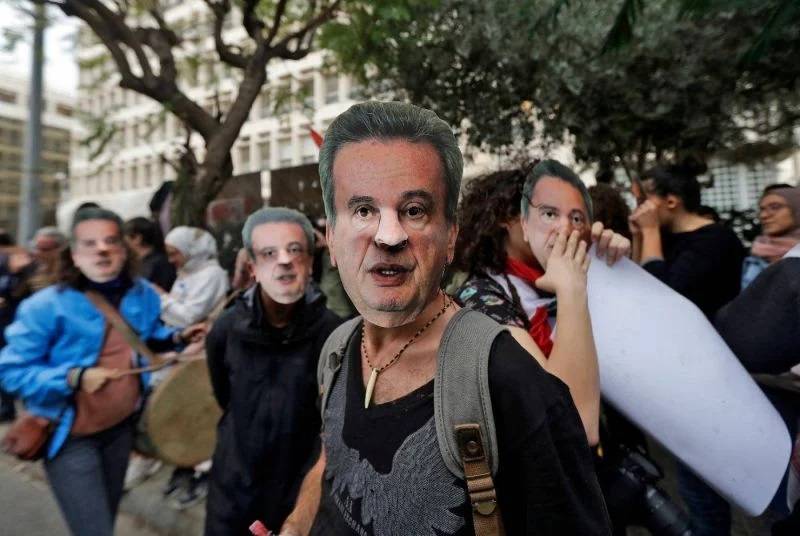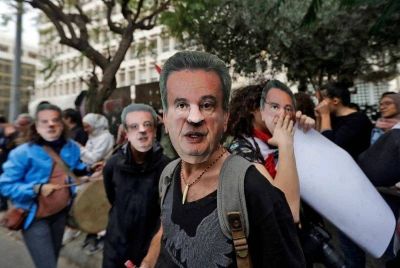
Protesters in front of the BDL headquarters in Beirut. (Credit: AFP/file)
Paris investigating judge Aude Buresi issued an arrest warrant on Tuesday against Banque du Liban (BDL) governor Riad Salameh, according to a source close to the case.
As expected, Salameh did not show up at the hearing to which he was summoned at 9:30 a.m. at the Palais de Justice in Paris, on the grounds that he was not notified. The subsequent arrest warrant announcement came like a thunderclap.
What are the legal implications for Salameh? How will the international community react to this measure? L’Orient-Le Jour spoke with Karim Daher, a Lebanese lawyer specializing in corruption-related cases, for an explanation.
What are the consequences of the arrest warrant for Riad Salameh?
The BDL governor has gone from being a witness and a suspect to being a defendant and a wanted man. However, we do not yet know the nature of this arrest warrant: is it French or international? Is it accompanied by an Interpol red notice? If the arrest warrant is accompanied by an Interpol red notice, sent around the world to locate and arrest him, he would not be able to move easily outside Lebanon, since he could be easily arrested. Riad Salameh can, however, appeal the decision, and he has just announced his willingness to do so.
Will Lebanon agree to extradite him if France asks for it?
It will be difficult to obtain his extradition because Lebanon refuses to extradite nationals. In addition, the United Nations Convention against Corruption, which France and Lebanon ratified, gives the country to which the extradition request is made the possibility of refusing it if it considers it likely to undermine its sovereignty, security and public order.
The convention also provides that when a country is asked for legal assistance, it may refuse it if the offenses charged against a person by a foreign country are similar to those for which that person is being prosecuted in his own country. In this case, Lebanon can invoke its jurisdictional sovereignty and argue that its domestic law prohibits it from executing the French request because Riad Salameh is under investigation and prosecution by the Lebanese judiciary on similar suspicions. But France could decide to continue to investigate and try Riad Salameh, as it did with Equatorial Guinea’s vice president Theodore Obiang.
In such a context, can Riad Salameh remain in his position?
The Code of Money and Credit provides for removing the BDL governor from office in case he fails to fulfill his obligations resulting from criminal offenses, such as influence peddling, abuse of office or other acts of corruption. The law also provides for his removal from office in the event of serious misconduct in the management of business.
The government should apply this rule against Riad Salameh before his term expires in July, even if a short period ahead of this date. Doing so would send a strong message against impunity and in favor of accountability. His impeachment would set an example for the governor’s successors, who will no longer venture to act as he did.
However, one wonders whether the politicians will agree to enforce the rule, especially since they have not suspended him to date, although he has been the subject of proceedings in France and Lebanon for the past two years.
How will the international community react if the BDL governor is not removed?
Lebanon’s image will be tarnished in the world. It is legitimate to ask how the states, especially France and other countries in which Riad Salameh is implicated, will react. Will the international central and correspondent banks there agree to deal with a central bank whose governor is kept in office while he is the subject of an international arrest warrant? Wouldn’t the FATF (Financial Action Task Force), the global observatory of money laundering and terrorism financing, place Lebanon on the gray or black list?
European countries may consider that Riad Salameh is protected by leaders who promote corruption at the expense of their people. Moreover, Salameh’s judicial file does not only include him, since the charges include criminal conspiracy. The European Parliament would then recommend the imposition of sanctions by the European Council, which could adopt executive decisions in this sense, provided that they are taken unanimously. Politicians, bankers and businessmen could thus be mentioned.
This interview was originally published in French in L’Orient-Le Jour. Translation by Joelle El Khoury.
